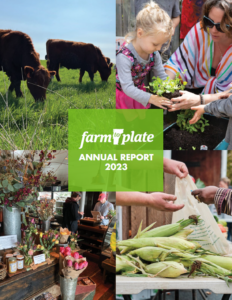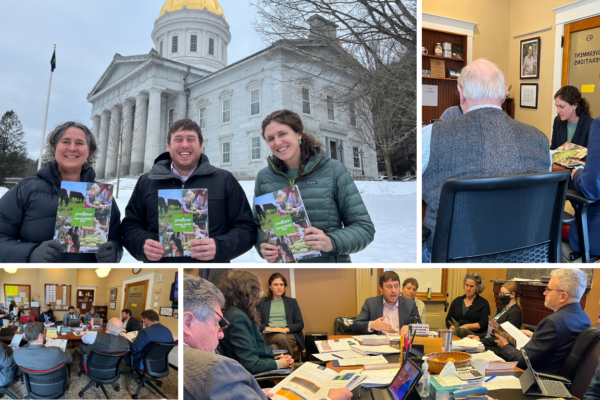Highlighting the 2023 Farm to Plate Annual Report
February 13, 2024

 Last year was a hard year on Vermont farmers and food businesses. A late spring frost resulted in significant losses for fruit growers, the July floods inundated farm fields of all types, though produce and hay crops were hit especially hard, and global grain shortages due to extreme weather events and the war in Ukraine drove costs of production up for Vermont’s organic dairy farms. The July floods also decimated Vermont downtowns and rural communities, with many beloved local restaurants put out of business indefinitely and independent grocers across the state battling flood damages to stores or road closures that made it difficult to keep shelves stocked and food available to local customers.
Last year was a hard year on Vermont farmers and food businesses. A late spring frost resulted in significant losses for fruit growers, the July floods inundated farm fields of all types, though produce and hay crops were hit especially hard, and global grain shortages due to extreme weather events and the war in Ukraine drove costs of production up for Vermont’s organic dairy farms. The July floods also decimated Vermont downtowns and rural communities, with many beloved local restaurants put out of business indefinitely and independent grocers across the state battling flood damages to stores or road closures that made it difficult to keep shelves stocked and food available to local customers.
Through it all, farmers and farmworkers, food business owners and employees, communities, NGOs, and state agencies showed admirable resolve. The call for transformational change is strong within the Farm to Plate Network, evident by the record attendance of 334 people at this year’s Annual Gathering which was appropriately themed “Transformative Change.” The current of transformative change runs throughout this year’s 2023 Farm to Plate Annual Report, with a focus on Network projects that reveal how the ground is being laid for transformation in different parts of the food system. These project highlights also point to remaining factors holding back accelerated and scaled transformation in the food system that should be of interest to policymakers, funders, researchers, and food system professionals. Highlighted projects include:
- The Agroforestry Priority Strategy Team’s work to bring attention to and integrate agroforestry approaches into programming and policy. Agroforestry is a promising strategy that offers co-benefits.
- The Retail Priority Strategy Team’s efforts through the Grocers Project to build the local food retail supply chain and counter the effects of retail and distribution industry consolidation.
- The CSA and Healthcare Community of Practice’s collaborative approaches to building connection between the food and health sectors to improve health outcomes.
- The New England Feeding New England project, and how states in the region are mobilizing together to build a more self-sufficient, resilient, and secure food system in the Northeast.
- Food Security in Vermont 2035: A Roadmap, the process for developing it, the five conditions for achieving food security that will guide implementation of the Roadmap, and implementation steps in 2024 and beyond for the Farm to Plate Network.
The Annual Report also provides a window into other Network activities and collaborations.
All of these 2023 projects illuminate the multi-faceted ways we are working together to achieve our collective goals to increase food system economic development, improving extreme weather readiness of our working landscape and Vermont as a whole, and improving healthy local food for all.
We understand as a Network that we will not achieve our goals alone, and transformative change will only come through deep collaboration and alignment across multiple scales—local, state, and federal—within the food system and with adjacent systems (e.g., healthcare, housing, transportation, education).
Click to Access the 2023 Farm to Plate Annual Report
On January 31, 2024, the Farm to Plate team and partners presented the Annual Report to the Vermont Senate Committee on Agriculture and then the Vermont House Committee on Agriculture, Food Resiliency, and Forestry.

Click to Watch the Vermont Senate Committee on Agriculture Testimony
Click to Watch the Vermont House Committee on Agriculture, Food Resiliency, and Forestry Testimony
About Vermont Farm to Plate
Farm to Plate is Vermont’s statewide food system plan implemented by 350+ member organizations of the Farm to Plate Network to meet the goals of legislation passed in 2009 calling for increased economic development and jobs in the farm and food sector and improved access to healthy local food for all Vermonters. Vermont’s farm to plate food system plan is the most comprehensive in the country and the only state that has complete government engagement. In 2019, Vermont Farm to Plate was reauthorized beyond 2020. The program is managed by the Vermont Sustainable Jobs Fund, a nonprofit organization based in Montpelier, Vermont.




